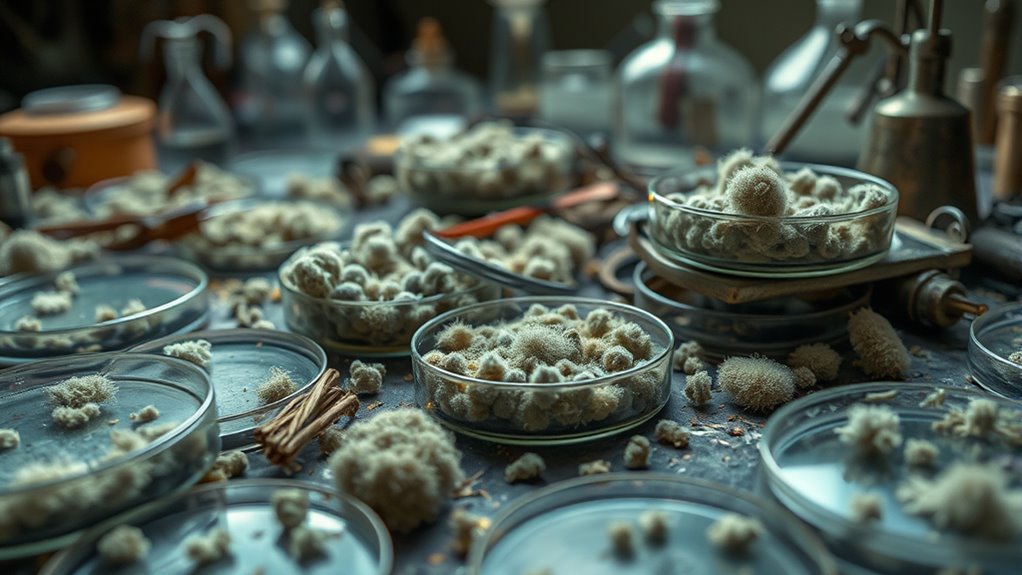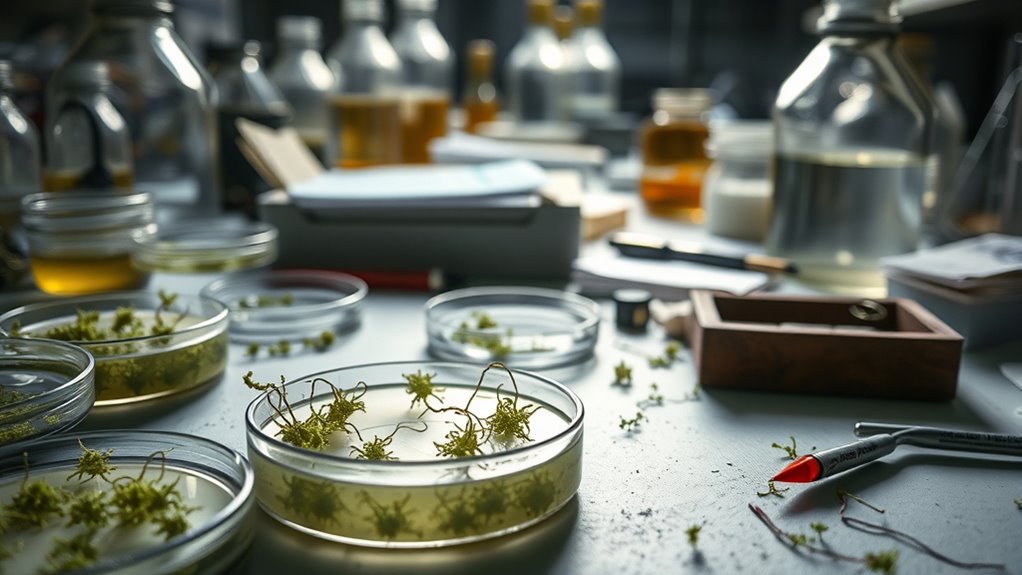The discovery of penicillin shows how luck, curiosity, and a messy lab can change history. When Alexander Fleming noticed mold growing in a petri dish, he saw bacteria dying nearby. This accidental find revealed the power of natural spores and the importance of observing unexpected results. His persistence in studying this contamination led to antibiotics that saved millions. If you keep exploring, you’ll uncover even more fascinating details behind this groundbreaking breakthrough.
Key Takeaways
- Alexander Fleming’s accidental observation of mold contaminating a petri dish led to the discovery of penicillin.
- The discovery was driven by curiosity and persistence amidst a messy, spores-filled lab environment.
- Isolating and mass-producing penicillin faced significant technical challenges initially.
- Penicillin revolutionized medicine by effectively treating bacterial infections, reducing mortality rates.
- The story highlights how chance, combined with scientific curiosity, can lead to breakthrough innovations.

Have you ever wondered how a simple mold revolutionized medicine? It all started with a chance observation in a cluttered lab, where Alexander Fleming noticed something unusual. A mold, later identified as Penicillium notatum, had contaminated one of his petri dishes. Instead of dismissing it, Fleming observed that the bacteria he was growing nearby had been destroyed. This accidental discovery was the spark that led to the development of penicillin, the world’s first true antibiotic.
Before this breakthrough, treating bacterial infections was often a gamble, with limited options and high mortality rates. Fleming’s keen eye and curiosity turned a messy, neglected petri dish into a milestone in medical history. This moment marked the beginning of antibiotic development, transforming how we combat bacterial diseases.
Fleming’s discovery came at a pivotal time when microbial resistance hadn’t yet become the widespread concern it’s today. His work showed that natural substances from molds could inhibit bacteria, opening the door to a new class of drugs. The process of developing penicillin into a usable medicine wasn’t straightforward. Scientists had to isolate the active compound, figure out how to produce it in larger quantities, and guarantee it was safe for human use.
The initial extraction was slow and inefficient, but perseverance paid off. Once penicillin was mass-produced, it dramatically reduced death rates from infections like pneumonia, syphilis, and wound infections. This breakthrough not only saved countless lives but also set the stage for future antibiotic development, paving the way for antibiotics to become a mainstay of modern medicine. Additionally, the discovery emphasized the importance of antibiotic stewardship to prevent resistance.
However, Fleming’s discovery also underscored the significance of understanding microbial resistance. As antibiotics like penicillin became widely used, bacteria evolved ways to survive these drugs. Over time, resistant strains emerged, making some infections harder to treat. This ongoing challenge highlighted the need for continuous research and innovation in antibiotic development. The role of antibiotics in medicine.
Fleming’s serendipitous find became a double-edged sword—saving millions but also prompting the arms race against resistant microbes. Today, the story of penicillin reminds us that even the most accidental discoveries can revolutionize medicine, but it also emphasizes the importance of responsible antibiotic use to preserve their effectiveness.
The messy lab, the spores, the chance encounter—these all played a role in shaping the future of medicine, demonstrating how curiosity and persistence can lead to life-changing breakthroughs.
Frequently Asked Questions
How Did Fleming’s Background Influence His Research Approach?
Your background shaped your research approach by fostering a strong sense of scientific curiosity and meticulous experimentation.
Growing up with a keen interest in science, you paid close attention to details and carefully observed results. This mindset helped you notice mold’s antibiotic properties, leading to groundbreaking discovery.
Your disciplined approach, combined with curiosity, enabled you to connect the dots and explore new possibilities in microbiology and medicine.
Were There Any Earlier Discoveries Related to Antibiotics Before Penicillin?
Imagine a medieval knight chasing distant rumors of magical potions—early antimicrobial studies were similar, seeking antibiotic precursors. Before penicillin, scientists experimented with substances like salvarsan and sulfonamides, laying groundwork for antibiotics.
These earlier discoveries didn’t quite conquer infections but sparked curiosity. You can see how these efforts, like rudimentary maps, guided future explorers toward the breakthrough we now celebrate as penicillin’s serendipitous triumph.
How Did Public Health Impact the Development of Penicillin?
Public health greatly influenced penicillin’s development by prompting stricter antibiotic regulation and the implementation of public health policies. These measures guaranteed safe production and distribution, preventing misuse and resistance.
You see, as awareness of bacterial infections grew, authorities prioritized funding and research, accelerating penicillin’s availability. Public health efforts helped establish standards that protected communities and guided responsible use, ultimately making penicillin a cornerstone of modern medicine.
What Role Did Other Scientists Play in Advancing Penicillin Research?
You see, other scientists played pivotal roles through collaborative efforts and technological advancements that pushed penicillin research forward. They shared knowledge, refined techniques, and developed new tools, which accelerated discoveries.
These collective efforts created a ripple effect, leading to breakthroughs faster than any single person could achieve alone. Their teamwork and innovations exemplify how scientific progress depends on collaboration and technology, ultimately transforming medicine and saving countless lives.
How Did Penicillin’S Discovery Change Modern Medicine Practices?
Your discovery of penicillin sparked an antibiotic revolution that transformed modern medicine. It dramatically improved infection control, saving countless lives and making surgeries safer.
Conclusion
So, your journey through the discovery of penicillin shows that luck often favors the prepared mind. Dr. Fleming’s accidental find, combined with his keen eye and messy lab, proves that sometimes, the biggest breakthroughs come when you least expect them. Keep in mind, it’s not just about following a plan but being ready to seize the moment. After all, fortune favors the bold—sometimes, all it takes is a little mess to change the world.








